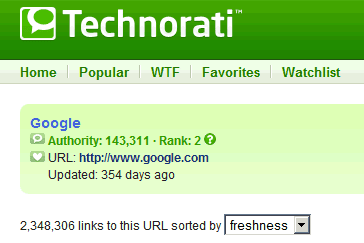
Technorati made some changes this month to show it's more than a blog search engine. "Technorati continues to grow well beyond its roots at the leading blog search engine; increasingly, we are the main aggregation point for all forms of social media on the Web, including blogs, of course, but also video, photos, audio such as podcasts and much more", noted David Sifry last month.
The site also introduced a score for each blog that measures the "authority". The pretentious name has one purpose: to cover the real meaning of the number. "Technorati Authority is the number of blogs linking to a website in the last six months. The higher the number, the more Technorati Authority the blog has," explains Technorati's blog. So each blog that links to me (no matter if it's a spam blog or Slashdot) increases my authority with 1. Imagine what would happen if Google's PageRank was proportional to the number of links to a page in the last 6 months: the top search result for most of the queries should be a page from yahoo.com or google.com, sites that would have the PageRank 100,000. It would be easy to increase your PageRank: just create a new site that links to you; it's as important as a link from New York Times. But fortunately, Google found a better way to rank web pages:
PageRank relies on the uniquely democratic nature of the web by using its vast link structure as an indicator of an individual page's value. In essence, Google interprets a link from page A to page B as a vote, by page A, for page B. But, Google looks at considerably more than the sheer volume of votes, or links a page receives; for example, it also analyzes the page that casts the vote. Votes cast by pages that are themselves "important" weigh more heavily and help to make other pages "important." Using these and other factors, Google provides its views on pages' relative importance.
Related:
How Google Blog Search ranks results
No comments:
Post a Comment